Related Research Articles

A nonprofit organization (NPO) or non-profit organization, also known as a non-business entity, or nonprofit institution, and often referred to simply as a non-profit, is a legal entity organized and operated for a collective, public or social benefit, as opposed to an entity that operates as a business aiming to generate a profit for its owners. A nonprofit is subject to the non-distribution constraint: any revenues that exceed expenses must be committed to the organization's purpose, not taken by private parties. An array of organizations are nonprofit, including some political organizations, schools, business associations, churches, social clubs, and consumer cooperatives. Nonprofit entities may seek approval from governments to be tax-exempt, and some may also qualify to receive tax-deductible contributions, but an entity may incorporate as a nonprofit entity without having tax-exempt status.
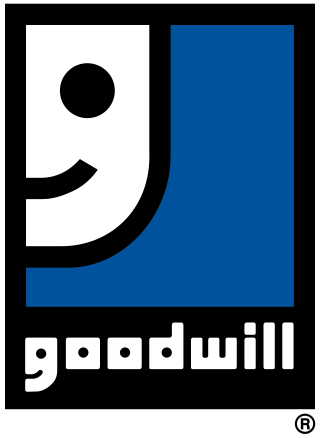
Goodwill Industries International Inc., simply known as Goodwill is an American nonprofit 501(c)(3) organization that provides job training, employment placement services, and other community-based programs for people who have barriers to their employment.

A charity shop (British English), thrift shop or thrift store or opportunity shop or op-shop is a retail establishment run by a charitable organization to raise money. Charity shops are a type of social enterprise. They sell mainly used goods such as clothing, books, music albums, shoes, DVDs, toys, and furniture donated by members of the public, and are often staffed by volunteers. Because the items for sale were obtained for free, and business costs are low, the items can be sold at competitive prices. After costs are paid, all remaining income from the sales is used in accord with the organization's stated charitable purpose. Costs include purchase and/or depreciation of fixtures, operating costs and the building lease or mortgage.

Fundraising or fund-raising is the process of seeking and gathering voluntary financial contributions by engaging individuals, businesses, charitable foundations, or governmental agencies. Although fundraising typically refers to efforts to gather money for non-profit organizations, it is sometimes used to refer to the identification and solicitation of investors or other sources of capital for for-profit enterprises.

Savers Value Village Inc. is a publicly held, for-profit thrift store retailer headquartered in Bellevue, Washington, United States, offering second hand merchandise, with supermajority ownership by private equity firm Ares Management. An international company, Savers has more than 315 locations throughout the United States of America, Canada, and Australia, and receives its merchandise by paying money to non-profit organizations for donated clothing and household items. Savers is known as Value Village in the Pacific Northwest, the Baltimore metropolitan area, and most of Canada, and Village des Valeurs in Quebec. Chicago stores and some locations in the Washington, DC metropolitan area are under the name Unique. In Australia and other regions of the U.S., the stores share the corporation's name.

Used goods, also known as secondhand goods, are any item of personal property offered for sale not as new, including metals in any form except coins that are legal tender, but excluding books, magazines, and postage stamps. Used goods may also be handed down, especially among family or close friends, as a hand-me-down.
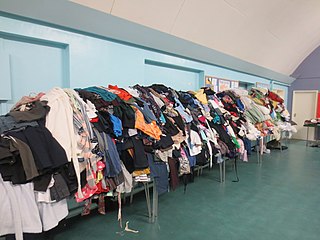
A jumble sale (UK), bring and buy sale or rummage sale is an event at which second hand goods are sold, usually by an institution such as a local Boys' Brigade Company, Scout group, Girlguiding group or church, as a fundraising or charitable effort. A rummage sale by a church is called a church sale or white elephant sale, frequently as part of a church bazaar.
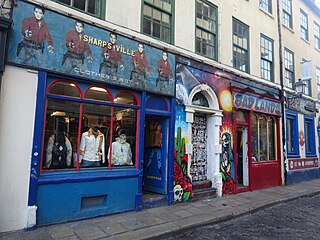
Vintage clothing is a generic term for garments originating from a previous era, as recent as the 1990s. The term can also be applied in reference to second-hand retail outlets, e.g. in vintage clothing store. While the concept originated during World War I as a response to textile shortages, vintage dressing encompasses choosing accessories, mixing vintage garments with new, as well as creating an ensemble of various styles and periods. Vintage clothes typically sell at low prices for high-end name brands.

Deseret Industries is a non-profit organization and a division of the welfare services provided by the Church of Jesus Christ of Latter-day Saints.

Planet Aid is a non-profit organization headquartered in Elkridge, Maryland. Its primary activity is the collection of clothing and other household items for resale and recycling. Founded in 1997 in Massachusetts, the organization has expanded down the East Coast of the United States and operates in 23 states, where it collects items through donation bins placed on sidewalks, parking lots, and other public areas.

Fast fashion is the business model of replicating recent catwalk trends and high-fashion designs, mass-producing them at a low cost, and bringing them to retail quickly while demand is at its highest. The term fast fashion is also used generically to describe the products of this business model. Retailers who employ the fast fashion strategy include Primark, H&M, Shein, and Zara, all of which have become large multinationals by driving high turnover of inexpensive seasonal and trendy clothing that appeals to fashion-conscious consumers.

Sustainable fashion is a term describing efforts within the fashion industry to reduce its environmental impacts, protect workers producing garments, and uphold animal welfare. Sustainability in fashion encompasses a wide range of factors, including "cutting CO2 emissions, addressing overproduction, reducing pollution and waste, supporting biodiversity, and ensuring that garment workers are paid a fair wage and have safe working conditions".
Casa Mesita refers to two separate non-profit organizations in Los Alamos, New Mexico. Casa Mesita Thrift Shop and Casa Mesita Group Home are two of many social enterprise organizations in Los Alamos County, one of the highest-income counties in the United States, in a state with household income far below the national median.
New Eyes for the Needy is a non-profit organization started in 1932 as New Eyes and based in Short Hills, New Jersey, which provides people in the United States with eyeglasses and sends recycled eyeglasses to needy people overseas.
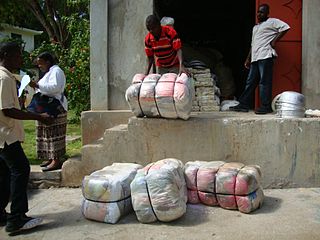
The global trade of secondhand clothing is a long-standing industry, which has been facilitated by the abundance of donated clothing in wealthy countries. This trade accounts for approximately 0.5% of the total value of clothing traded worldwide, while by weight it accounts for 10%. However, in some countries, imported used clothing constitutes the majority of clothing purchased and used.

Cotton recycling is the process of converting cotton fabric into fibers that can be reused into other textile products.
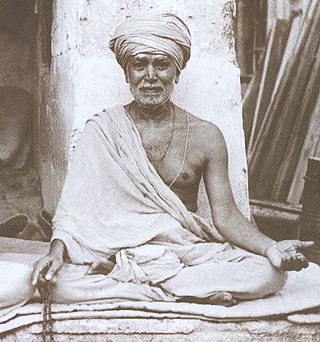
BAPS Charities is an international, religious, charitable organization that originates from the Bochasanwasi Akshar Purushottam Swaminarayan Sanstha (BAPS) with a focus on serving society. This focus on service to society is stated in the organization's vision, that "every individual deserves the right to a peaceful, dignified, and healthy way of life. And by improving the quality of life of the individual, we are bettering families, communities, our world, and our future." BAPS Charities carries out this vision through a range of programs addressing health, education, the environment, and natural disaster recovery. The organization's worldwide activities are funded through donations and are led by a community of over 55,000 volunteers who are mostly members of BAPS. The volunteers work with local communities and other charities and the organization's activities are mainly based out of their mandirs.
Gaia-Movement Living Earth Green World Action USA, Gaia Movement USA, or simply Gaia, is a charitable organization based in Chicago, Illinois which collects used clothing for resale ("recycling") in the United States and developing countries.
Operation Come Home is an employment, education and support centre for homeless and at-risk youth in Ottawa, Ontario. Their programs assist street-involved youth ages 16 and up. Operation Come Home first opened its doors in 1971, and was then known as Operation Go Home. They are located at 150 Gloucester Street in downtown Ottawa. They are a non-profit organization that receives no regular government funding...

Suay Sew Shop is a sustainable clothing and accessory manufacturing company based in Frogtown, Los Angeles. Through upcycling of textiles, Suay reclaims used garments and uses them to create new items.
References
- ↑ Table 1, Page 7. Municipal Solid Waste Generation, Recycling, and Disposal in the United States: Facts and Figures for 2011.
- ↑ "SMARTTalk". Archived from the original on 2016-03-04. Retrieved 26 March 2016.
- ↑ http://www.usedclothingdrive.com/wp-content/uploads/2013/09/SA-Program-Overview-Used-Clothing-Drive.pdf%5B%5D Program Overview page 4 "Our Community Partner"
- ↑ http://www.usedclothingdrive.com/wp-content/uploads/2013/09/SA-Program-Overview-Used-Clothing-Drive.pdf%5B%5D Program Overview page 5 "How much can you raise"
- ↑ Ottawa Citizen More Ottawa Citizen. "The UpBeat: Glashan Used Clothing Drive kicks off on Earth Day". Ottawa Citizen. Retrieved 26 March 2016.